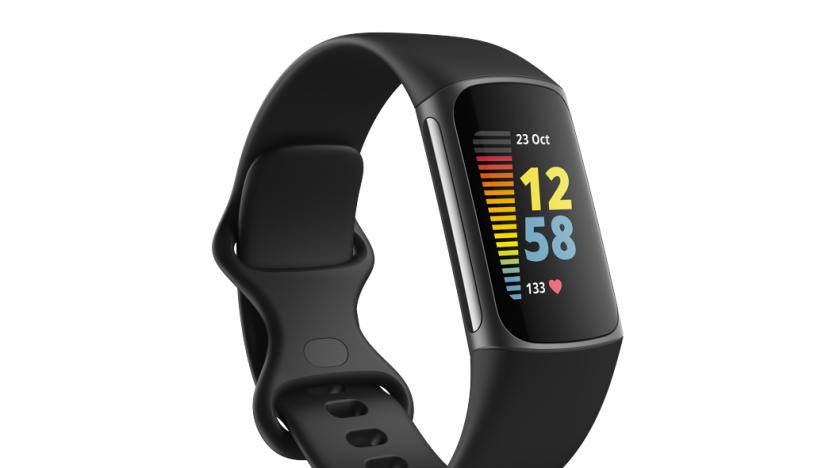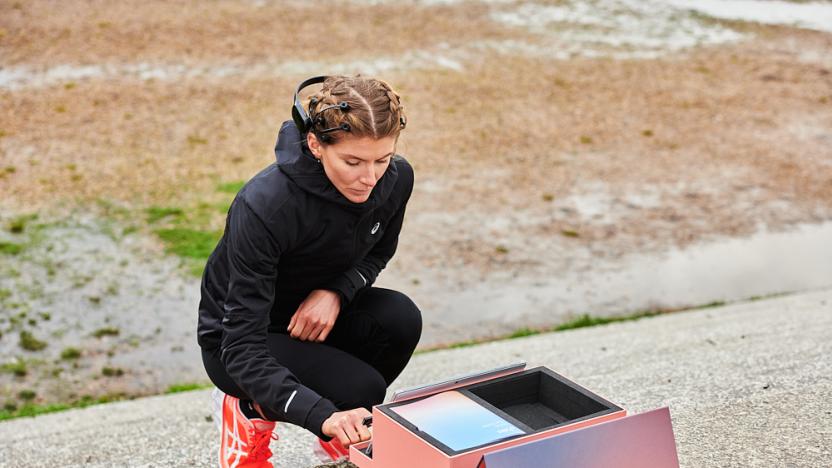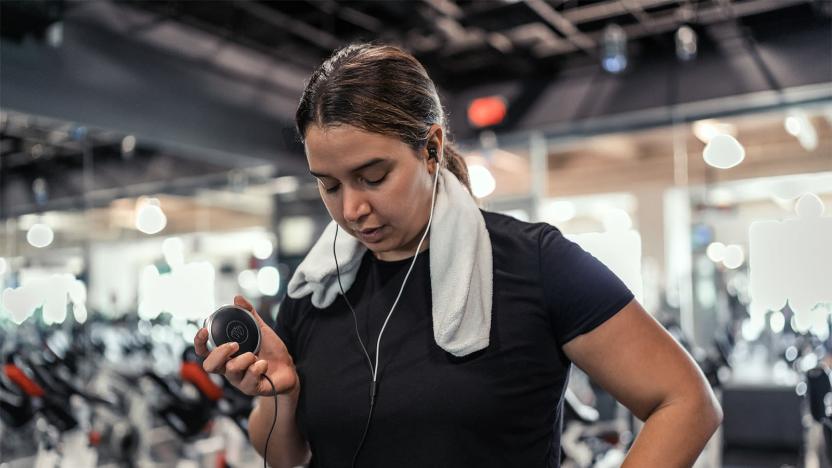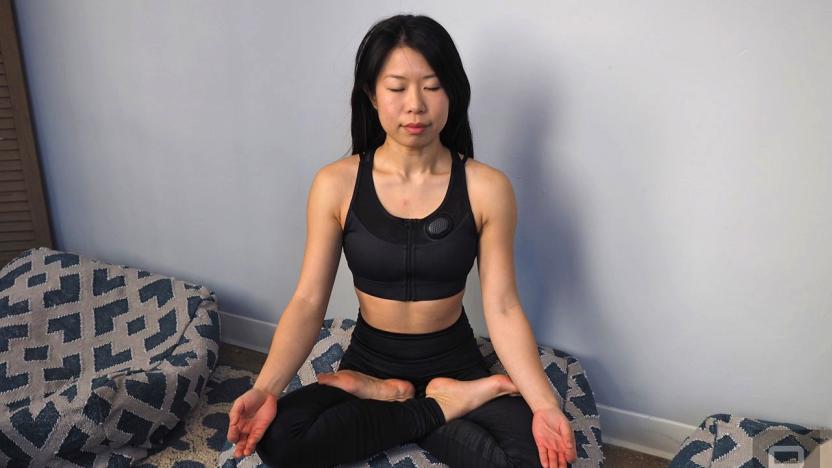Stress
Latest

Fitbit’s Charge 5 packs an ECG and stress response sensor
The Charge 5 gets new sensors to measure your heart health and stress response.

Asics used EEGs to prove that, yes, running makes you happier
Using an EEG, researchers found runners were less stressed, were able to relax more and had clearer thinking after a 20 minute exercise.

Cove neckband vibrates behind your ears to reduce stress
The neckband massages the mastoid, which is thought to reduce stress.

Headspace is offering free mindfulness courses to unemployed Americans
Mindfulness app Headspace is offering a free one-year subscription to anyone in the US who is unemployed.

Neuvana's stress-reducing earbuds are available to pre-order for $399
Neuvana's calming earbuds are nearly here after a long, long development process, although you may be in for a few surprises. The company has started taking pre-orders for its nerve-stimulating Xen buds at a $399 price ahead of their winter release. That's significantly higher than the $299 mentioned when we first saw Neuvana's tech in 2016 (and doesn't include the $4 per month premium for more waveforms and signals) but it's also considerably sleeker with a simple puck replacing the box we first saw. The intended effect remains the same, of course -- it's all about reducing stress and invoking inner peace.

My DNA test confirmed it: I’m not a morning person
There's a coded judgment that people who do well in the mornings hold against those of us who do not. "You're just not a morning person," they say, the words dripping with the implication that our sluggishness in the AM is a result of slovenliness. It's the same subtext you see held against fat people, as overweight bodies are viewed as the result of some moral failing. Thankfully, I have in my hand a piece of paper -- well, on my computer, a PDF -- to refute those biases. I'm not a morning person because I'm lazy, but because it's coded into my genes.

These 'cathartic' stress robots can take a beating
Whether it's a meditation app or looking at puppy videos, much of today's technology focuses on replacing your negative feelings with positive ones. But what if you want to act on all your feelings of anger, sadness and anxiety -- in a healthy way? Going off the idea that facing negative emotions head-on can be good for a person's well-being, researchers at Carnegie Mellon University created "cathartic objects" that are designed to be hit, stabbed and even sworn at. Lead by researcher Michael Luria and co-authors Amit Zoran and Jodi Forlizzi, the team presented their paper on the cathartic objects at the 2019 CHI Conference on Human Factors in Computing Systems held this month in Glasgow.

Your smartphone is a 'security blanket' for your social life
Do you instinctively reach for your smartphone whenever you're in an awkward chat with unfamiliar people, or just feel like you're the odd one out? There's likely a good reason for it. Researchers have published a study indicating that people treat their smartphones as "security blankets" to help them cope with uncomfortable social situations. In experiments, they found that people allowed to keep their smartphones had lower stress hormone levels when ignored in conversations, whether or not they were allowed to use the devices. Just the presence of the phone was enough to set them at ease, to put it another way.

Mental health and the relentless YouTuber life
Jacques Slade was spending a week at the beach recently, away from the internet and his responsibilities as a full-time YouTube creator, where he's about to reach 1 million subscribers. It was supposed to be a time to relax and enjoy life. But being stress free, even on vacation, doesn't come easily for him. Slade, who makes videos about sneakers and technology, said he couldn't fully enjoy it because he was worried about not having anything to post on YouTube when he returned. "I don't have content for the next four or five days," Slade worried. "What's that gonna do to me? What's that gonna do to my bottom line? When I come back, are people still gonna watch my videos?"

Spire's health tracker sticks on clothes and never needs charging
Wearable fitness monitors promise a lot but research shows that nearly a third are abandoned in junk drawers because they're too fiddly, require too much maintenance or users are simply forgetting to put them on. Health monitoring company Spire thinks it's found the answer to these woes with the Spire Health Tag, the smallest ever fitness tracker that doesn't need to be charged and never has to be taken off.

A vibrating smart bra keeps tabs on how zen you feel
Name an article of clothing, and some company has probably crammed a fitness tracker into it. We've seen connected shirts, shoes and even bras. But most of these focus on the time you spend active -- steps walked, distance ran, stairs climbed and so on. But while keeping track of your exercise helps create a picture of your health, it's only half the image. What you do and how you feel while resting is also important. The Vitali is a new sports bra hitting Kickstarter today that focuses on the other side of your well-being, keeping track of your breathing, posture and heart rate to help you maintain that yoga-like calm on and off the mat.

Finding inner peace (with help from your smartphone)
Technology is draining. Social media networks are programmed to make you come back for more, constantly swiping to refresh, like and post. You are constantly at your PC, your smartphone, your TV. You fall asleep to Netflix or reading Twitter as it spits up funny gifs or more bad news. It can wear you down. You're no longer in college with all the energy in the world and next to no commitments or obligations. You need to know when to unwind, avoid burning out and control (at least some) of your unhealthy (perhaps excessive) tech habits.

NASA studies astronaut twins to observe the rigors of space
When you spend nearly a year straight in space, you can expect NASA will want to conduct a good bit of research on you when you return to Earth. The space agency has been doing just that with astronaut Scott Kelly who was in orbit for 340 days. There's no one better to compare Kelly to than his twin brother and fellow astronaut Mark. NASA collected blood and other biological samples to look for any changes a long spaceflight may cause in the human body.

The Caeden Sona stress-fighting tracker caused me anxiety instead
It sounds like a great, if somewhat abstract, idea. The Caeden Sona is a gorgeous wristband with a heart rate monitor that constantly measures your pulse, in an attempt to gauge how you respond to stress. It then teaches you to build resilience to stress through daily focus and breathing exercises. I tried out the Sona for about a week and was ultimately so overwhelmed by its design flaws that I was, ironically, overcome by stress.

Melomind's brain-soothing helmet gets redesigned for 2016
Technology can be stressful, and the only way to stop a bad gadget from acting on your brain is with ... a good gadget. That's the idea behind myBrain's Melomind headset, which uses neuro-feedback to try and calm your troubled head. The device clamps onto your skull and uses an EEG to examine how your brain is feeling at any point. Once it has a picture of your stress levels, it pumps specifically soothing audio back into your ears through a pair of headphones.

Emvio's smartwatch will tell you when you're stressing out
Smartwatches are growing ever more capable by the day. Sometimes, though, there's no harm in a little focus. Enter Emvio, a watch with one core goal: to help you manage stress. There are no message notifications or apps, instead, Emvio monitors variations in your heart rate (HRV), only bothering you (ironically) once your stress levels start to rise. Your daily data is also fed to an app which can help you spot trends or individual stress triggering events, helping you better plan to manage them in the future. Can a single-focus connected watch cut it against growing competition? Its creators certainly think so, and they're hoping enough people on Kickstarter will, too.

Google Glass can tell if you're stressed
It's not always easy to tell when your stress levels are through the roof, and you may not always want to break out a heart rate sensor just to find out when it's time to relax. You might not have to, if researchers at Georgia Tech and MIT have their way; they've developed BioGlass, an Android app that uses Google Glass to determine how frazzled you are. The software measures your heart and breathing rates by checking for tiny movements picked up by Glass' accelerometer, gyroscope and front-facing camera. In theory, you'd only have to wear the smart eyepiece to know when it's time to calm down.

The Daily Grind: Do you like to tank in MMOs?
The very first serious MMO tank I ever played was my day-one Warrior in World of Warcraft. I'd had dozens of characters in MMOs before that, but I was too chicken to step up and actually tank endgame fights. After all, as Massively commenters pointed out, there's a lot more to tanking than just taunting the boss and knowing when to hit your specials. Tanks need leadership and game knowledge far exceeding what's expected of other party archetypes. They're expected to lead the party, to know how the fights work, and to keep everyone else in line. Tanking is setting yourself up for a world of stress and the judgment of strangers. Depending on your temperament, it can become unfun in a hurry. I still play that Warrior when I resub, Protection-specced for all the days I've played her (minus an hour back in 2006 when I foolishly thought Fury might be nice for a change). But I'm always leery of dungeon-queueing with that character even though I love the actual mechanics of being the meatshield. What about you folks? Do you actually like tanking in MMOs? How do you overcome the stress? Every morning, the Massively bloggers probe the minds of their readers with deep, thought-provoking questions about that most serious of topics: massively online gaming. We crave your opinions, so grab your caffeinated beverage of choice and chime in on today's Daily Grind!

Watch a small Insomniac team make its next game, Slow Down Bull
Ratchet and Clank series developer Insomniac Games announced a new pet project this week, Slow Down Bull. The game is in development for PC by a small team of four or five people at the studio. Slow Down Bull is an action game in which players will attempt to rein in an "overachieving" bull named Axel, who is keen on collecting "beautiful things." Axel's nature is of the more temperamental and tumultuous variety however, so players will need to help Axel stay stress-free while collecting the game's goodies. Little else is known about the project, such as its targeted release window, though it is being created in Unity. A small piece of concept art for the game can be found after the break. The small team does intend to host livestreams of Slow Down Bull's development process every Friday afternoon on its Twitch channel at 2:00 p.m. PT (5:00 p.m. ET), starting tomorrow. Meanwhile, a larger chunk of the developer is working on getting its Xbox One exclusive game Sunset Overdrive ready for its release on October 28. [Image: Insomniac Games]

Samsung's mobile health app can now tell when you're stressed out
The Galaxy S5's heart rate sensor has mostly been handy for fitness gurus, but it's now helpful for the rest of us, too. Samsung has pushed out an update to S Health that uses the sensor to track stress levels; if your heart is racing after a bad day at work, you'll know. The app also tracks long-term trends, so it should be clear when you're overdue for a vacation. While S Health won't help you get rid of the annoying coworkers or personal dramas that cause stress, the app will at least make it clear that it's time to relax.












